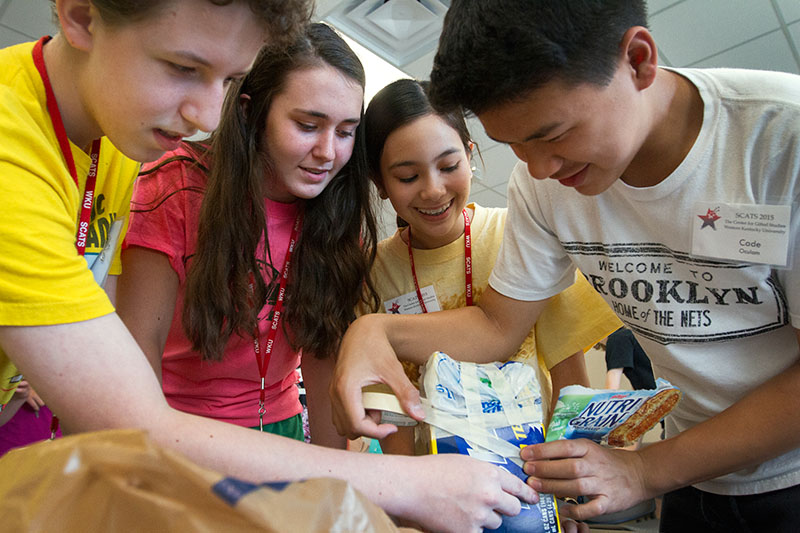By Josh Raymer
Multiple choice, fill-in-the-blank, and true/false questions have given many students the misconception that learning is all about finding the right answer. As SCATS campers taking Disease Detectives, Creative Problem Solving, and Leadership and Teamwork: Past, Present, and Future have learned, that’s not always the case. These three classes have pushed students beyond the black and white world of “finding the right answer” into a murky gray area where there might not be an answer at all.
“Some students have enjoyed it,” Robin Howard, the Disease Detectives instructor, revealed. “Some of them are looking for black and white and they want an answer. They don’t want to operate in the gray. But the world of science is a big gray area.”
Robin challenged her students during the first week of SCATS with a real-world scenario that those in the medical field constantly confront – a disease outbreak. The students were given CDC reports describing symptoms and possible causes of the outbreak. Each day, new information would emerge that shifted what students previously thought about the mystery disease.
What campers like Emma Fridy of Louisville are learning, however, is that the pursuit of an answer can be just as rewarding as finding the answer itself. “I think it’s a little frustrating because we’re not sure this module we’re working through has an answer,” Emma admitted on Friday. “At the same time, it’s OK to discuss your different ideas and, since there’s no right answer, everyone can bring their ideas together in a class discussion. That works toward learning a lot.”
Teamwork and thinking outside the box were important themes in Creative Problem Solving. Instructor Lyndsey Duke stressed that problem solving could be something as simple as figuring out how to find a pencil without asking the teacher, or something as challenging as finding a new route when a road on your commute is closed. “You use problem solving in everything that you do,” she said. “It’s important for our students to understand that and be able to use it on an everyday basis.”
Lyndsey’s students have honed their problem solving skills by building a tower out of 100 drinking straws and tape that could support a tennis ball for 30 seconds, analyzing prompts and formulating solutions, and designing a durable container for the egg drop that began on Friday. If their eggs survived the first round of testing in the classroom, students will drop their eggs from the second-floor balcony at Ransdell Hall today.

The whole process has stretched students like Luke Parsons of Antioch, Tenn., who said: “It’s fun but also challenging because it’s not yes or no. You have to think. I’m not that good at it. I took this class so I could get better at it and I definitely am.”
Rhiannon Wilson, a Morgantown resident and member of Future Problem Solvers at Grayson County Middle School, says she can implement the skills she’s learning in class into her own life once SCATS is over. “You go through trials and tribulations in everyday life,” she explained. “During those times, you have to come up with several different solutions and figure out which one will work best.”
Learning to work with other people promotes successful problem solving. That’s the approach Lisa Phillips has taken with her class, Leadership and Teamwork: Past, Present, and Future, and it’s already rubbed off on the way Louisville native Aud Thacker approaches a problem. “We might have seven options we can do,” she described. “I want to know what everyone else likes best. To me, every option has a great outcome… even if it doesn’t. I love thinking optimistically.”
The class got a taste of teamwork early on by working in groups for the imaginary Buenos Dias Marketing Company, whose mission was to help other companies advertise by designing customizable merchandise. Creating a marketing plan and a promotional product forced students to play up the strengths of their teammates while minimizing their weaknesses. It was an enlightening experience for everyone, including Louisville resident Elijah Brazel, who was in Aud’s group.
“We learned to identify the problem and then decide how we can work as a group to solve the problem,” he said. “I’ve learned how teamwork applies to real life.”
For a class with such practical applications as Leadership and Teamwork, problem solving became a top priority for Lisa. “Problem solving is so far reaching. It’s not only for school but every aspect of their lives. I make it a point that this is not just about how problem solving works in school,” she said.
Like any teacher at SCATS, Robin hopes her students will build upon the lessons they’re learning in Disease Detectives. That’s a big reason her class focuses on problem solving. “Any time we can bring real-word experiences to the table, it gives students a taste of what life is like,” she said. “If there’s one thing I can leave them with on Friday, it’s that they continue their journey in the sciences and the problem-solving world. I want to create a curiosity within them for what goes on in the world.”
Zain Hammad of Bowling Green believes the “passionate disease project” the class began last Friday, in which students report on a disease they’re passionate about, will benefit him moving forward. “The passionate disease project gives you a great start if you want to go into the medical field,” he said. “This class also teaches you how to politely communicate and disagree and not hurt people’s feelings.”
Like problem solving, communication skills are always worthwhile to learn.
“Learning how to disagree with people and how to communicate with them is valuable in any field you could go into,” Emma concluded.
